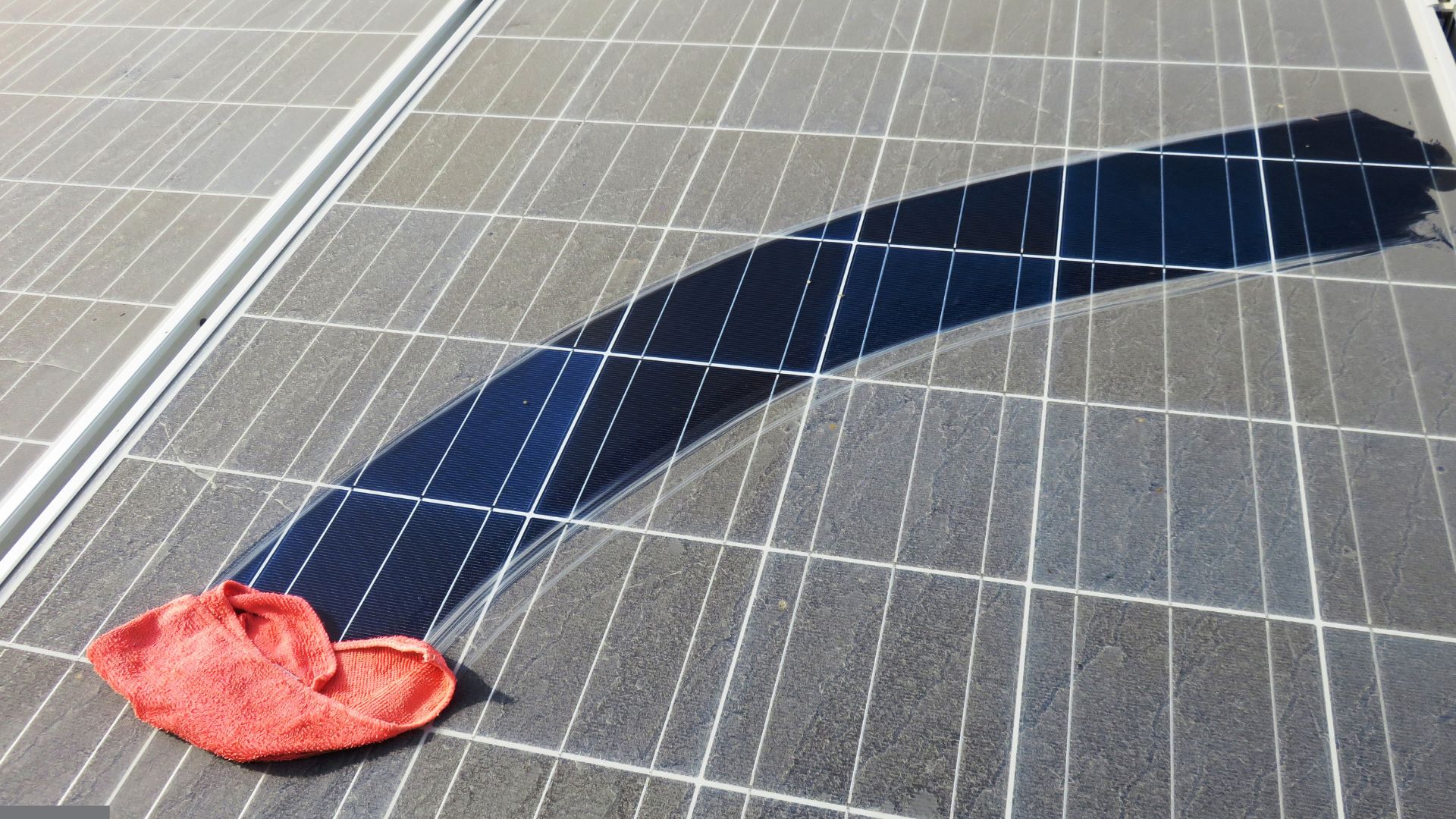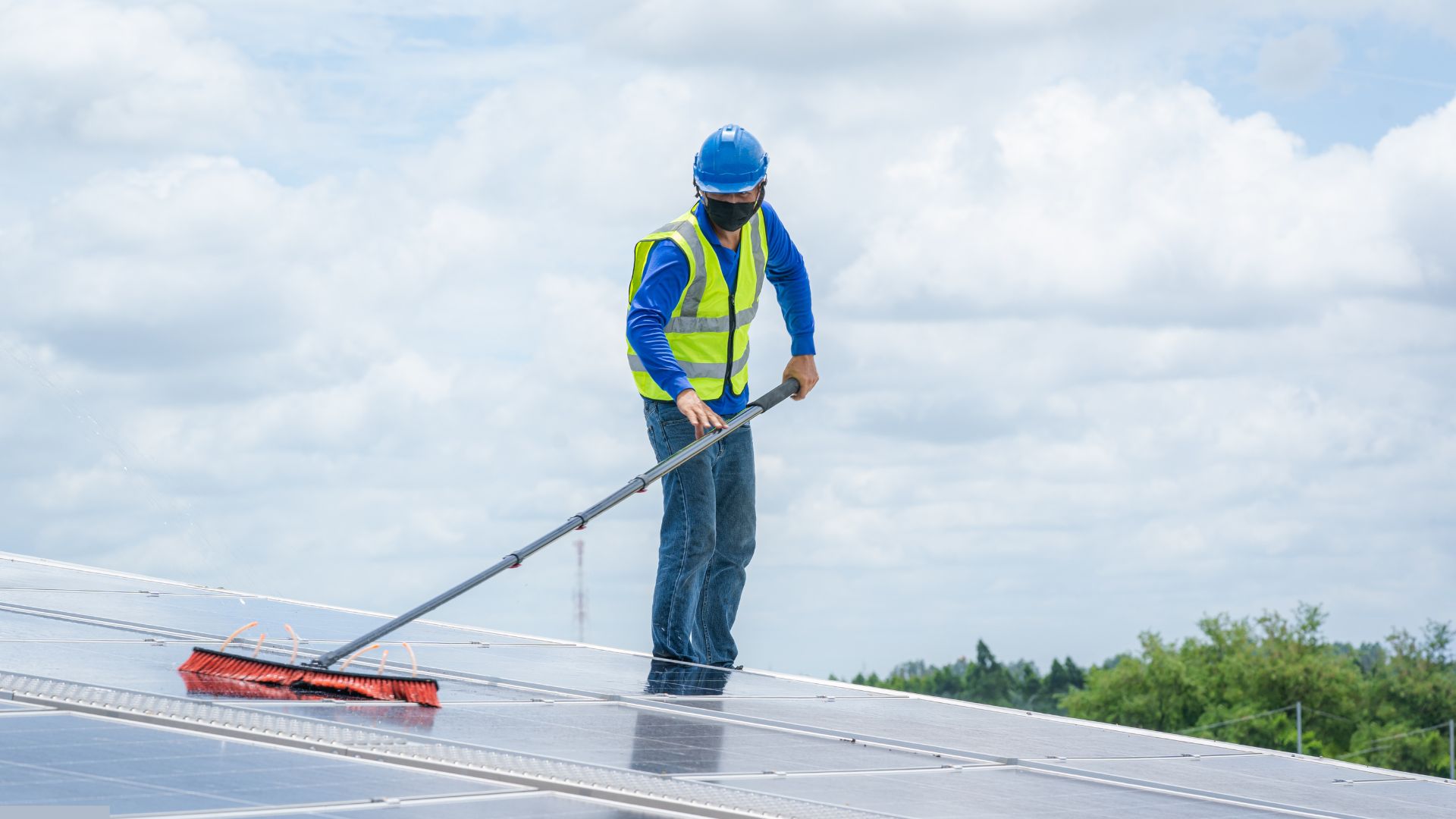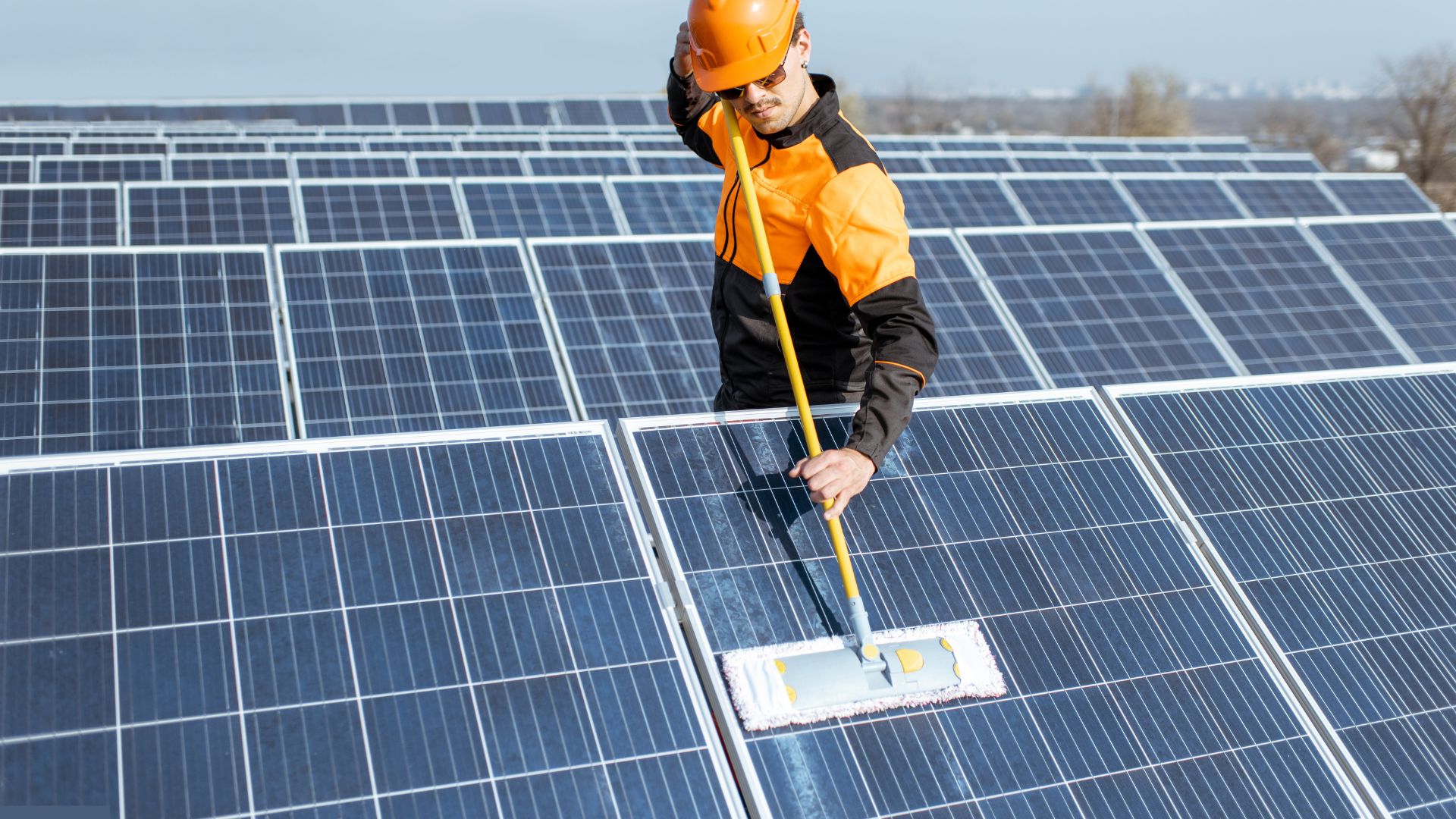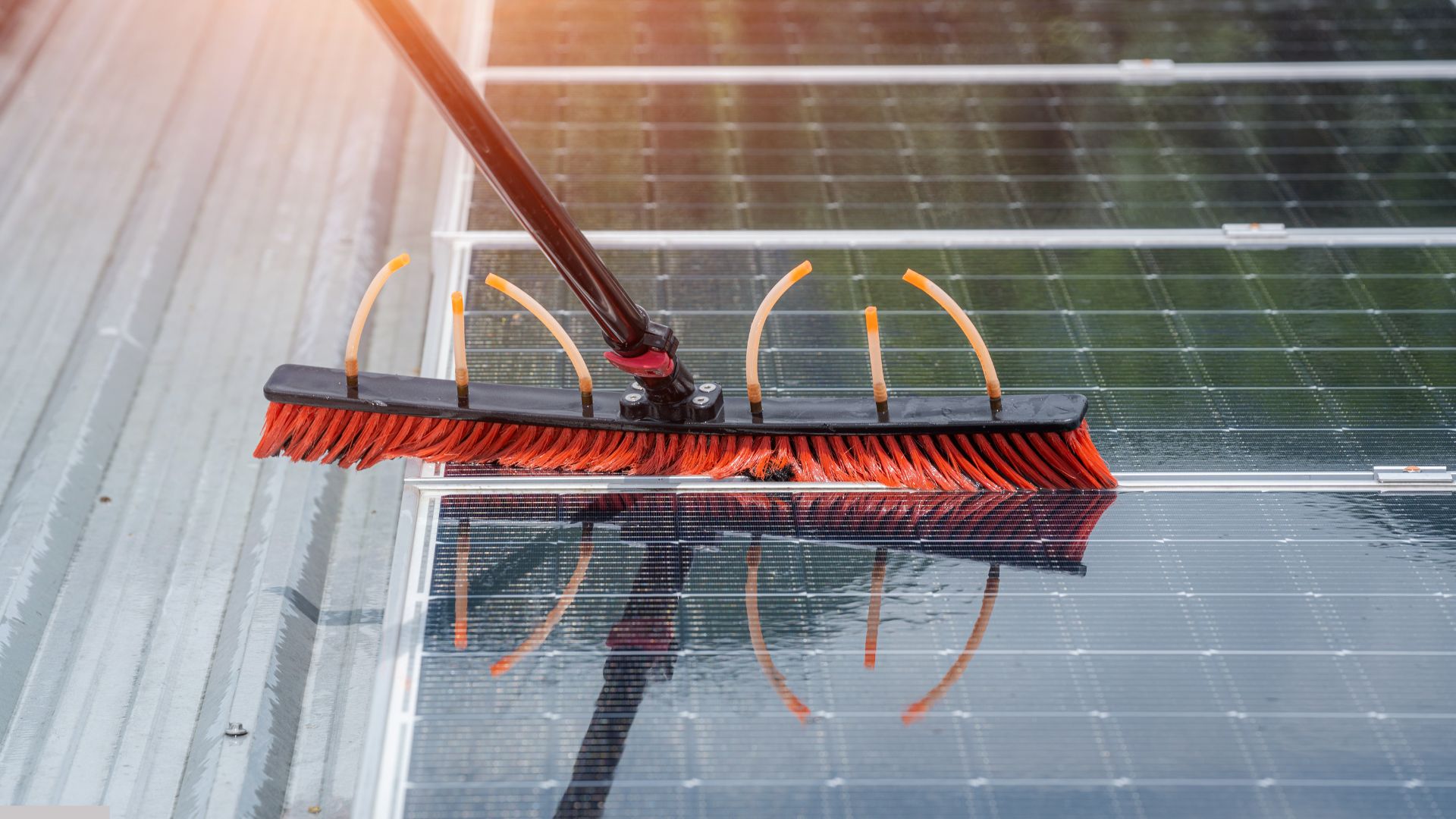Solar panel cleaning is a crucial yet often overlooked aspect of home and business maintenance that can significantly impact your solar system’s performance.
Have you ever wondered how much energy your solar panels may lose due to dust, debris, or bird droppings? Are you aware of how this might affect your electricity bills and the efficiency of your energy system?

Common Maintenance Tasks
Solar panel cleaning is crucial for ensuring optimal performance and longevity of the panels. Here are some detailed tasks that should be routinely performed:
- Visual Inspections: Check panels regularly for any physical damages like cracks, chips, or warping. This also includes inspecting the mounting frames and support structures. Look for signs of rust, structural weakness, or loose bolts, as these can compromise the stability and efficiency of the installation.
- Cleaning: Surfaces should be free of dust, pollen, bird droppings, and leaves. These contaminants can significantly block sunlight and reduce efficiency. Cleaning should be gentle to avoid scratching the panels, which can cause permanent damage.
- Performance Monitoring: Monitoring systems track voltage and overall energy production. Sudden drops in power output can indicate issues such as shading, obstructions, or equipment failures.
- Cable and Connection Checks: Inspect all electrical connections for signs of wear, corrosion, or damage. Loose or damaged cables can lead to a loss of power and pose fire hazards. Ensure that all junction boxes and inverters are securely closed and that there are no exposed wires.
Best Practices for Solar Panel Cleaning
Effective cleaning is key to maintaining solar panel efficiency. Here are the best practices to consider:
Frequency of Cleaning
The frequency of cleaning depends on the environment. More frequent cleaning—possibly monthly—may be needed in dusty areas or places with frequent bird droppings. Otherwise, a bi-annual cleaning may suffice.
Water Quality
Use soft, deionized water for cleaning, as hard water can leave mineral deposits on the panels. If only tap water is available, it’s important to dry the panels thoroughly after rinsing.
Automated Cleaning Systems
For large installations, consider investing in automated cleaning systems, such as robotic cleaners or sprinkler-like systems, that can maintain panel cleanliness with minimal manual intervention.
Avoid Harsh Chemicals
Never use abrasive powders or harsh chemicals that could scratch or degrade the panels’ surface. A mild, biodegradable soap or just plain water is usually sufficient.

The Option of Professional Cleaning Services
Using professional solar panel cleaning services instead of doing it yourself can make a difference. These experts have the right equipment and know-how to handle your solar panels with the utmost care. They don’t just clean; they use their skills and special tools to give your panels a deep and safe clean without causing any damage.
Here’s what you get with professional help:
- Thorough and Safe Cleaning: Professionals have the right tools and methods to remove tough dirt safely.
- Expert Inspection: They do more than just clean. They can spot problems early, which saves you money on future repairs.
- Convenience: Let them do the work so you can focus on other things. It’s a real time-saver.
When looking for a cleaning service, it’s important to choose one that’s reliable and experienced. Check for good reviews, proper licensing, and insurance. Remember, investing in professional cleaning might seem like a cost upfront, but keeping your panels effective and extending their life pays off.
Factors Affecting the Cost of Solar Panel Cleaning
Several factors affect the final price when figuring out how much it costs to clean solar panels. Here’s a breakdown:
- Size of your solar panel array: Bigger setups with more panels take longer to clean, which can raise the cost.
- Location of your panels: If your solar panels are in tricky spots or hard to reach, you might need special equipment and safety measures, which can increase the price.
Let’s also consider these specific factors:
- Panel accessibility: If it’s easy to access your rooftop, you might pay less. However, steep roofs might require extra safety gear, bumping the price.
- How dirty the panels are: Panels with a lot of tough dirt will require more work to clean, which could make them more expensive.
- How often you clean them: Cleaning your panels regularly can save you money in the long run. It prevents dirt from building up too much, making cleaning more accessible and cheaper.
Considering how much it costs to clean solar panels is like uncovering layers of an onion—there are many aspects to consider. However, weighing these costs against the potential expense of not cleaning your panels is essential. Neglecting them could lead to damage and costly repairs or replacements.
Recommended Frequency for Solar Panel Cleaning
Cleaning your solar panels regularly is essential to maintain their efficiency. Typically, it’s a good idea to clean them twice a year, but this can vary based on where you live. Here’s what might affect how often you need to clean your panels:
- Pollution Levels: If you live in a highly polluted area, you might need to clean your panels more often to stop residues from building up.
- Climate: If it rains a lot where you are, the rain can help keep your panels clean. However, if you’re in a dry, dusty place, you should frequently clean them.
- Foliage: If many trees are around, your panels could collect leaves or sap, meaning they’ll need cleaning more often.
Keep an eye on their energy output to ensure you’re cleaning your panels as needed. A drop in performance usually means it’s time for a clean. For the best results, consider getting advice from a professional cleaning service. They can help create a cleaning schedule that fits your needs and location.

Seasonal Solar Panel Cleaning & Maintenance
Different seasons in the UK pose unique challenges and opportunities for solar panel cleaning:
- Spring: This is a good time to perform a thorough cleaning and inspection after the winter months. Check for any issues caused by winter storms or freezing temperatures, such as cracked glass or dislodged panels.
- Summer: With higher dust levels and potential bird droppings, summer requires frequent monitoring and cleaning to ensure maximum energy absorption. It’s also a good time to trim any foliage that may create shade as the sun changes position.
- Autumn: Falling leaves and increased rainfall can obstruct panels and accumulate moisture, leading to potential fungal growth. It’s crucial to keep the panels clear to maximize the reduced hours of sunlight available.
- Winter: Snow and ice can completely block light from reaching the panels. While snow generally melts off fairly cleanly from the smooth surface of solar panels, removing snow accumulation is important to maintain power output. Use a soft brush to gently remove snow without scratching the panels.
Benefits of Hiring Professional Solar Panel Cleaners
- Expertise and Efficiency: Professional cleaners are trained to handle solar panels safely and effectively. They use specialized equipment that cleans quickly without risking damage to the panels or your property.
- Thorough Maintenance: Professionals do more than just clean; they conduct comprehensive inspections to identify any potential issues, such as loose connections or damaged panels, that might otherwise go unnoticed until they cause serious problems.
- Safety: Professional solar panel services eliminate the risk of climbing roofs or handling large equipment, significantly reducing the likelihood of personal injury.
- Warranty Preservation: Many solar panel manufacturers require certain maintenance standards, including professional cleaning, to keep warranty terms valid. Professionals ensure these standards are met, which can be crucial for expensive repairs covered under warranty.
- Convenience and Longevity: Regular professional cleaning extends the lifespan of solar panels by ensuring they operate at optimal efficiency and are free from materials that could cause long-term damage.
Keep Your Panels Pristine and Productive
Understanding how solar panels work underscores the critical need for regular maintenance and cleaning to ensure they operate at peak efficiency. While the tasks involved in maintaining solar panels are manageable, they require consistent attention and knowledge of best practices.
EvoEnergy now only provides cleaning services to commercial clients and, therefore, no longer offers this service for domestic customers. If you’re looking for information on the process of cleaning your solar panels, please download the appropriate document relevant to the type of panel you currently have installed on your property:
- Trina – Page 5: Maintenance and Care
- ZnShine – Page 9/10: Cleaning
- Suntellite – Page 5/6: Maintenance
- Sharp – Page 3: Maintenance
- Sanyo/Panasonic – Page 4: Maintenance
- Suntech – Please see the whole document
By prioritizing the care of your solar panels, you’ll maximize your energy production and extend your investment’s lifespan. Remember, well-maintained solar panels are key to harnessing the sun’s power most effectively and achieving sustainable energy solutions for the future.

FAQ’s About Solar Panel Cleaning and Maintenance
From understanding how solar panels work to navigating seasonal cleaning challenges and weighing the pros and cons of DIY versus professional cleaning, we’ve compiled everything you need to know to keep your solar energy system running smoothly. Let’s delve into the FAQs to address your key queries and empower you with the knowledge to optimize your solar panel performance.
What are the most common maintenance tasks for solar panels?
Common maintenance tasks include visual inspections for physical damages, regular cleaning to remove dust, pollen, and bird droppings, performance monitoring for energy production issues, and checking electrical connections for wear or damage.
How should solar panel cleaning be approached in different seasons?
Seasonal cleaning and maintenance vary depending on weather conditions. For instance, spring is ideal for thorough inspections after winter, while summer may require more frequent cleaning due to dust and bird droppings. Adjusting cleaning routines to address seasonal challenges like snow in winter and falling leaves in autumn is essential.
What are the pros and cons of DIY solar panel cleaning?
DIY cleaning offers cost savings and flexibility but carries risks of injury and potential damage to panels if not done correctly. It also requires time and effort, especially for larger installations.
What are the benefits of hiring professional solar panel cleaners?
Professional cleaners bring expertise, efficiency, and safety, ensuring thorough maintenance without risking personal injury or panel damage. They also help preserve warranties by meeting manufacturers’ maintenance standards and extending the longevity of solar panels through regular professional cleaning.
How do solar panels work, and why does cleanliness affect their efficiency?
Solar panels convert sunlight into electricity through solar cells, but cleanliness is crucial for optimal performance. Accumulated dirt, debris, and residues can block sunlight, reducing the panels’ ability to generate electricity efficiently. Clean panels capture more sunlight, directly influencing energy production.
How do weather conditions impact solar panel cleanliness and maintenance?
Weather conditions in the UK, including frequent rainfall, pollen, and bird droppings, can lead to faster accumulation of dirt and debris on solar panels. Understanding these factors helps determine the appropriate cleaning frequency and seasonal maintenance routines to ensure optimal energy production.
What indicators indicate that my solar panels may need professional cleaning or maintenance?
Several indicators suggest it may be time for professional cleaning or maintenance. These include a noticeable decrease in energy production, visible dirt or debris accumulation on panels, evidence of shading from nearby trees or structures, or physical damage such as cracks or discoloration on panel surfaces. Regular performance monitoring and visual inspections can help identify issues early and prevent potential efficiency losses.
Are there any environmental considerations when cleaning solar panels?
Yes, it’s essential to consider environmental impacts when cleaning solar panels. Using harsh chemicals or improper cleaning techniques can harm surrounding vegetation, soil, and water sources. Opting for eco-friendly cleaning solutions and methods helps minimize environmental harm while maintaining panel efficiency.
What role does solar panel cleanliness play in reducing electricity bills and maximizing ROI?
Clean solar panels produce substantially more electricity than dirty ones, directly impacting electricity bills by maximizing energy production. Solar panel owners can maximize their return on investment by ensuring optimal performance through regular cleaning and maintenance, generating more clean energy, and reducing reliance on traditional grid power.
